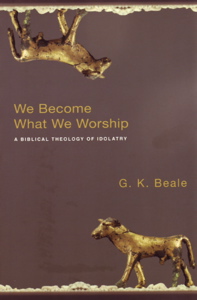 Biblical Theology has become a sort of passion for me in the past year. I was first introduced to biblical theology through Graeme Goldsworthy, and have since enjoyed Vaughan Roberts and now G.K. Beale, both writing biblical theology. In his latest work, We Become What We Worship: A Bibilical Theology of Worship, G.K. Beale examines the biblical theme of idoloatry that runs from Genesis through Revelation. Beale’s main thesis is What people revere, they resemble, either for ruin or restoration (p.16).
Biblical Theology has become a sort of passion for me in the past year. I was first introduced to biblical theology through Graeme Goldsworthy, and have since enjoyed Vaughan Roberts and now G.K. Beale, both writing biblical theology. In his latest work, We Become What We Worship: A Bibilical Theology of Worship, G.K. Beale examines the biblical theme of idoloatry that runs from Genesis through Revelation. Beale’s main thesis is What people revere, they resemble, either for ruin or restoration (p.16).
The theme is developed initially with a detailed look at Isaiah 6 where, the author posits, the Lord’s judgment upon Israel is to give them exactly what they have desired. As an idolatrous people, Israelites had worshipped carved images with eyes that did not see and ears that did not hear. God’s judgment upon them through Isaiah’s ministry is the give them what they have desired, they become what they have worshipped…people with eyes that do not see God’s deliverance and ears that do not hear God’s offer of salvation.
From hear Beale develops his theme by showing how it permeates all of Scripture. Even in Jesus’ gospel ministry, though there is not specific mention of idolotry, the people are said to be worshippers of money and tradition, both of which Beal identifies as forms of idol worship:
Israel in Jesus’ time was, indeed, guilty of idol worship–a different form of idol worship than in preceding generations. Israel of Jesus’ day was idolatrous because it had worshiped tradition in pllace of God and his living Word, and this is why Jesus applies the idol text of Isaiah 6:9-10 in Matthew 13 to the Jews of his generation.
Beale closes his book with a look at the book of Revelation. The chapter on Revelation, which may be the best chapter in the book, examines the ways that the various people mentioned in John’s visions have become like the government upon which they rely for their well-being in place of God.
All in all, this is a great book but not for the faint of heart. Beale has written a great, in-depth volume of Biblical theology. In the introduction, he states as his intention to write a book that is appealing across the wide range of academia as well as laity. I do not believe he has achieved his goal because this book is definitely more than the average member of your congregation would care to consume. The middle of the book seemed slow reading, but the strong finish made it all worth while. I was a bit disappointed when it ended. I was blessed and challenged by Beale. This is not an easy read, but it is a worthwhile read if you are interested in a deeper more meaningful understanding of sin and grace in God’s word.


Pingback: Passion For Preaching » Blog Archive » Book Recommendation: Counterfeit Gods